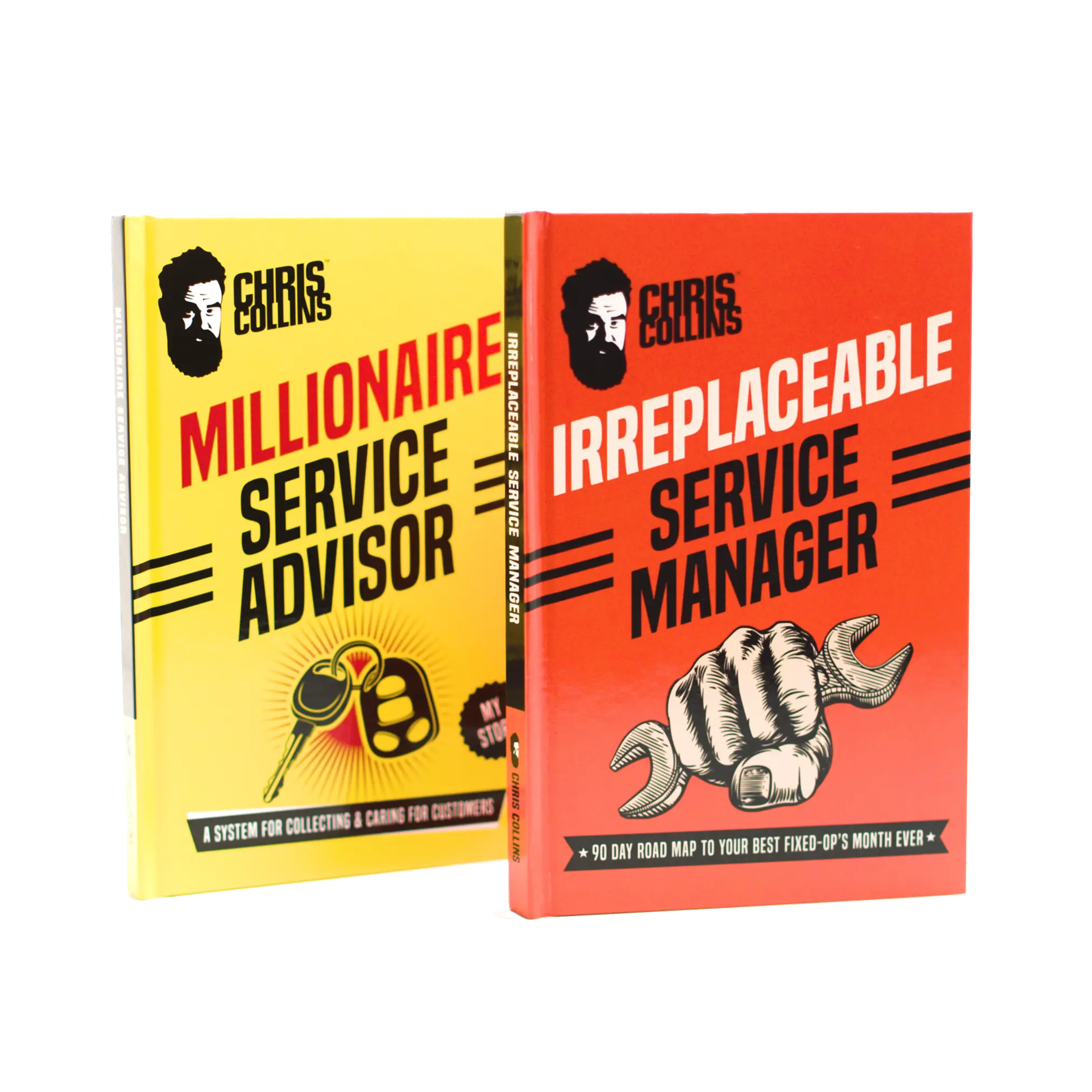Video Transcription:
Why are you Unhappy with your CP Sales?
Hi, Chris Collins here and Mario. Today we are going to talk about why you are unhappy with your CP labor sales, and we have five reasons why you are unhappy about your CP labor sales. We’re dealerships all over the country and what we’re famous for is increasing customer retention, CSI, and CP labor sales.
The number one thing that I have down here Mario is that you don’t have a system. You just go out there, use your desk adviser, go to work, but no system whatsoever. So how we know you don’t have a system is when we come in and go to your payroll. And we can go to 25 repair orders and if everyone doesn’t have inspection sheet, and if the work isn’t either recommended or sold, then you don’t have a system. It’s either in the inclined line or sold, there’s nothing in between. So we go through 25 orders and if they don’t have inspection sheets, or like half of them usually have inspection sheet maybe, if there are recommendations it’s not in the inclined line and it wasn’t sold, it’s not really a system, not really clear.
The second thing we do is go to history on your RO and see, what the car’s due for and if it was recommended. And most of the time, ninety percent of the work that the car is due for isn’t recommended when we go in and do an ROI. And I would say that those two things and watching the service drive and just the flow of the customers in the drive tells us that they don’t have a system.
There are usually hundreds of thousands of dollars in a missed opportunity that just never was recommended. It’s funny and I did a survey of customer I think over ten years ago and still is true to this day, they ask customers why they didn’t maintain their car, and the number one reason why customers didn’t maintain their car was, they weren’t told. The number two reason, they didn’t understand. The number five reason, price. Price wasn’t it. It was the adviser didn’t tell them, and if they did tell them, they didn’t understand what it was they were telling them. And I would throw in that more important than all that is probably they didn’t trust the adviser either because they didn’t connect with them on a deeper level. So that’s the first reason why your CP sales are low.
The second reason is the techs don’t believe. When we do go restock for the repair work, we call on some technicians and say, ‘Hey Mario, why don’t you fill out some inspection sheet to be thorough.’ And the tech would say ‘Ahh, I filled out the inspection sheet but the adviser never sold it for.’ They start noticing when they start penciling off the inspection sheet. The important thing is, the advisers need to be accountable for offering the work and if the work is so, putting the work into inclined line under repair order. The second thing technicians need to understand that in this industry, even good advisers sold four out of ten they recommend. So they write up ten customers and there’s something to sell in all ten of those cars, only four of those customers of really good advisers will buy right then. And a couple will come back on the inclined line with the work later. But, right there, when they draw up the inspection sheet, it’s the minority. It’s like baseball; the hitter that bats 300 is a great hitter. So, 3 out of ten is great. But the technicians need to understand that the key to it is consistency. Because if the technician touches 20 cars and they only do an inspection sheet on five, they’re looking at one upsell potential. But if they do 20 on 20 cars, then they’re looking at maybe eight upsell in 20 cars.
So, it’s like baseball, you wanna explain to the technician that consistency is the key because you’re not going to hit ten out of ten. It’s very rare that an adviser is that good will get that lucky and get ten out of ten. Three, four out of ten is really good.
One other thing I’ve noticed is when you lose consistency with your technician; they don’t wanna do the inspection sheet. You get it back and you know that there’s something recommended that you write down. So you have to waste time, you have to call them and ask them ‘Is this all or anything else because it’s checked off in the sales’ So, you have to keep that relationship with them and you have to keep them in the loop that you are either making sales or declining. Just giving a little feedback to the customers; it’s all they’re looking for sometimes, knowing that you went up in the bad, trying to sell them off something that the technician didn’t put in.
The communication is vital in telling them. Even if there’s a big one and the customers said they’re coming back, just tell the technician ‘I offered it and they say they’re gonna come back.’ Is not gonna let the technician rule it out. The car’s coming back, I recommended it, I’m gonna get the work done. But if there’s no communication, the technician might say, this guy’s not even selling. You’re not only telling them.
The number three thing is that in our industry, there’s a trend to try to automate almost everything. So we have digital inspection sheets, we’re trying to automate service drive. We’re trying to automate everything. The key to our industry is people and unless you can do it in paper, unless you can do a paper inspection sheet and get that system right, the automation is not gonna work. We’ve yet to go into a store where they have an automated inspection sheet and it worked when actually the sales have gone down because their system wasn’t tight, to begin with. So you have to be able to have a system, inspect the system, and keep the system going before you plug the software on top of it.
There’s a great saying about software being garbage in, garbage out. If you can’t do it in paper and make it simple and get the adviser to introduce the inspection sheet, get the techs to do it, and the work either in the sold line or inclined line, you’re not gonna be able to automate that process. It could actually hurt your sales most of the time.
The number four, you didn’t train your advisers. Your advisers produce more gross profit than anybody else in the dealership and they get no training whatsoever. They’re thrown out there and nobody teaches them how to connect with customers, how to sell, how to do time management, none of it. None of that ever happened. Training your advisers and creating a culture of training, how many times did you get from your advisers like ‘Man, this is the best training I’ve ever had.’ And I was like. ‘What other training have you had?’ Nothing. I don’t know, so is our training really any good? We’re the only training they ever had. Training, and training your advisers.
Number five is creating a culture of constant improvement. If you’re training your advisers, and they’re role-playing, and you have morning training meeting and sharing with everybody what’s working and getting their feedback, you’re creating a culture of constant improvement where everybody is sharing and everybody is getting better, together.
And those are the five keys, number one is not having a system, number two is the techs don’t believe, number three is trying to automate before you can do it in paper, running before you can walk, four is not training, and number five is not having a culture of constant improvement and involving everybody and sharing.










